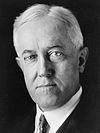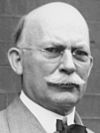1924 Democratic National Convention
|
1924 presidential election |
|
 
Nominees
Davis and Bryan |
|
| Convention | |
|---|---|
| Date(s) | June 24 – July 9, 1924 |
| City | New York, New York |
| Venue | Madison Square Garden |
| Candidates | |
| Presidential nominee | John W. Davis of West Virginia |
| Vice Presidential nominee | Charles W. Bryan of Nebraska |
 |
|
|
|
The 1924 Democratic National Convention, also called the Klanbake, held at the Madison Square Garden in New York City from June 24 to July 9, 1924, took a record 103 ballots to nominate a presidential candidate. It was the longest continuously running convention in United States political history. It was the first major party national convention that saw the name of a woman, Lena Springs, placed in nomination for the office of Vice President. John W. Davis, initially an outsider, eventually won the presidential nomination as a compromise candidate following a virtual war of attrition between front-runners William Gibbs McAdoo and Al Smith.
Davis and his vice presidential running-mate, Charles W. Bryan of Nebraska, went on to be defeated by the Republican ticket of President Calvin Coolidge and Charles G. Dawes in the 1924 presidential election.
The selection of New York as the site for the 1924 convention was based in part on the recent success of the party in that state. Two years earlier, in 1922, thirteen Republican congressmen had lost their seats to Democrats. New York had not been chosen for a convention since 1868. Wealthy New Yorkers, who had outbid other cities, declared their purpose "to convince the rest of the country that the town was not the red-light menace generally conceived by the sticks". Though dry organizations opposed the choice of New York, it won McAdoo's grudging consent in the fall of 1923, before the oil scandals made Smith a serious threat to him. McAdoo's own adopted state, California, had played host to the Democrats in 1920.
McAdoo swept the primaries in the first real race in the history of the party, although most states chose delegates through machines and conventions, giving most of their projected votes to local or hometown candidates, referred to as "favorite sons".
...
Wikipedia
